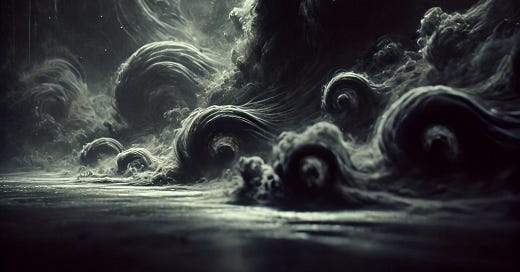Myth of the Day: Erebus
In the primordial depths of ancient lore, a deity of pure darkness emerges, embodying the shadows of the underworld.
Region/Culture: Greece, Mediterranean Europe
Mythos: Greek Mythology
Primary Type/Nature: Gods and Deities
Mythical Attributes: Erebus personifies the profound darkness of the Underworld.
Role in Mythos: In Greek cosmogonies, Erebus emerges as one of the earliest beings, born from Chaos and a progenitor of other deities through Nyx.
Relation to Humans: Erebus influences human fate indirectly through his offspring, such as Hemera (Day), who affects the daily lives of humans. The Greeks also perceived Erebus as integral to the journey of souls, highlighting his omnipresent role in life and afterlife narratives.
In the shadowed whispers of ancient Greek lore, where the birth of the cosmos still echoes through the chasms of history, there emerged a figure cloaked in impenetrable darkness. Erebus, a deity less seen than felt, resides in the heart of the profound obscurity that blankets the Underworld. Not shaped in the likeness of mortal or god with discernible features, Erebus is the embodiment of the velvet black that precedes night, a darkness so dense it seems almost tangible.
According to the myths, Erebus was not merely born but rather emanated from Chaos, the primordial void. As one of the first entities to split from this formless expanse, Erebus became the sibling to Night (Nyx), and together, they wove the dim fabric of the universe, stark against the nothingness from which they sprung. This lineage places Erebus at the cosmic family tree’s roots, where his role as progenitor of other deities unfolds. His unions, particularly with Nyx, fostered a lineage that includes Aether (Brightness) and Hemera (Day), further complicating his relationship with the spectrums of light and darkness.
Among the tales of Erebus, none is more telling than his ambiguous dominion over the shadowy paths souls tread en route to the afterlife. Erebus’s realm is not Hades in its entirety but rather the gloom-filled corridors through which all souls must pass. This makes him a silent sentinel over the most final of journeys, his presence an everlasting shadow cast upon the human soul at its most vulnerable.
The powers of Erebus are as peculiar as they are profound. As the personification of darkness, he wields the ability to cloak the world in shadow, manipulating the boundary between light and sight. Yet, his influence extends beyond mere absence of light; it reaches into the very essence of obscurity that can cloud minds and obscure truths. However, his might is not without limits. Erebus cannot venture far from the shadows he commands, bound eternally to the dim and the dark. His existence is tied to the absence rather than the presence, making him as much a prisoner of his realm as its ruler.
Through the veil of years and the shift of civilizations, the figure of Erebus remains a constant symbol of the necessary balance between light and dark, revealing how even the gods are subject to the primal forces from which they arise. As such, Erebus serves not only as a mythic character but as a metaphor for the unknown thresholds we all must face, wrapped in the inevitable cloak of darkness that both conceals and defines the very fabric of existence.
Suggested Further Reading
If you enjoy our content, please consider making a donation to support the people of Ukraine. Click here to visit the official Ukrainian donation website.
Explore more myths and wonders by visiting godsandmonsters.info.
Enjoy mythic tales on the move with our podcast, Five Minute Mythology.





As a Supergiant Games' Hades fan, I can't help grinning every time something related to Greek Mythology pops up in your newsletter :3